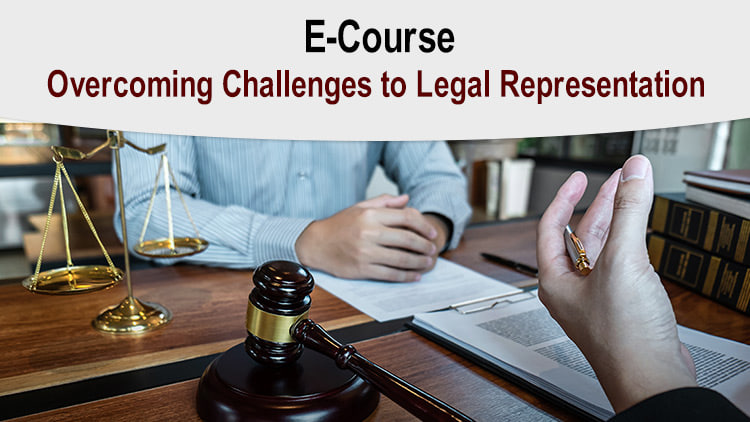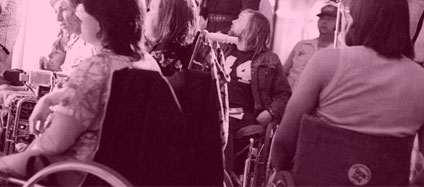3.1: Lesson Objectives
I am not sure whether I am a leader, but I know that becoming one means that you perceive the urgent need to address a problem – that you feel the need to fill a space by initiating activities, campaigns, and programs to focus on specific issues. If people in your community truly believe that you are fulfilling a need, then they will support you, bestowing upon you the position of leadership. When people trust you, they will look to you to help them reach their own goals.
– Asma Khader, former president of the Jordanian Women’s Union. Khader has led campaigns against honor crimes and violence against women and girls in Jordan.
You are taking this course because you want to make your community better. However, it is very difficult to achieve change on your own, so you will want to convince others to join you. You need to lead the way.
In this lesson, you will learn how to:
identify and polish your skills so you can become an effective leader in your community.
identify skill sets in others so they can help you build a winning team.
Who is a Leader?
A leader is someone who:
influences others to do something
guides or inspires others
provides direction and a plan
The fact that you care deeply about the problem you want to solve can give you strength as a leader and rally others to support you. It allows you to make emotional connections with people to persuade them to follow you based on shared concerns. Pushing for change is not easy. Knowing and remembering what you are passionate about will help you to work through the challenges you will encounter as an activist.
3.2 Leadership Experience
Your past experiences are an important source of leadership strength. Many leaders begin to exercise leadership through community work. You will want to remember your past accomplishments (and challenges) to guide you as you move forward. In addition, you will want to consider how your own leadership strengths contributed to that success.
Take a moment to reflect on the following questions:
What have you accomplished in your life (personal and professional)?
Have you already had the opportunity to make a positive difference in your community?
If you’ve achieved change, how did you do that?
3.3 Leadership Styles
There is no single model for successful leadership, and some leaders use different styles depending on the situation. The table below describes four different styles of leadership:
Authoritarian or Autocratic: The leader tells followers/team members what to do and how without seeking their input. The leader commands others.
Participative or Democratic: The leader engages followers in the decision-making process and asks for their views on what to do and how. The leader still maintains final decision-making authority.
Delegative or Free Rein: The leader sets a vision and priorities, but allows followers to make their own decisions about how to achieve that vision. The leader remains responsible for the decisions that are made.
Inspirational: The leader has no authority or responsibility for the actions of his or her followers. The leader inspires others to take certain actions, by communicating a vision, or setting an example through his or her own actions.
Consider the civic leaders interviewed on the Tavaana website and other leaders you know. These don’t have to be famous world leaders; they can be people you have met in your life, such as women and men in your community.
Did these leaders use any of the leadership styles described above?
What are the advantages and disadvantages of each leadership style?
How do leaders come to achieve their stature? Do people fear them? Admire them? Share their vision?
3.4: Positive Leadership Qualities
Some leaders use force, power and threats to make others do what they want. Other leaders inspire and persuade people to willingly follow them. The positive qualities of leaders who persuade, rather than force, others to join them include being:
Communicative
Knowledgeable
Passion-driven
Giving
Courageous
Self-sacrificing
Inclusive
Purposeful
Understanding
Persuasive
Caring
Collaborative
Ethical
Self-confident
Organized
Charismatic
Decisive
Resourceful
Determined
Honest
If you feel that you do not possess all the qualities listed above, don’t worry! Be honest about your strengths and weaknesses, and don’t be afraid to ask for help from your allies.
When I stepped into the project, I was lacking in every way. Yet this weakness became my most powerful tool […]. It provided opportunities for people to meaningfully join the project; it gave people the opportunity to develop and exhibit their strengths and allowed for the maturation of leadership amongst the participants. This participatory process provided a way to begin to repair the frayed social fabric of the community, a way for people to reconnect with each other through working together.
– Lily Yeh, founder of the Village of Arts and Humanities in Philadelphia, Pennsylvania
Approaches and styles for exerting leadership are as unique as the leaders themselves, but still there are leadership skills that can be learned.
3.5 Leadership Skills
Emotional Intelligence
Emotional intelligence describes the interpersonal skills and awareness that effective leaders possess. This includes the ability to predict and control our emotions, as well as the sensitivity to interpret and work with other people’s emotions.
These skills are needed to elicit enthusiasm and cooperation from the people we work with, and they can be just as important as technical knowledge or general intelligence.
There are five major components:
Self-awareness
The ability to monitor your inner feelings from moment to moment and realize what you are feeling. For example, if you can recognize that you are feeling anger, you can identify the anger and manage it effectively.
Self-management
The ability to control your emotions and ensure that they do not impact negatively on your work. Once you are aware of your feelings, you can teach yourself to shake off negative emotions like anxiety, suspend judgment and think carefully before acting.
Motivation
A motivated leader works hard, has clear goals, and is constantly striving to do better. He/she remains optimistic instead of being defeated if things do not go as planned. How do we effectively motivate ourselves?
Be Optimistic
It is important to have a strong expectation that things will turn out all right in the end
It is fine to react emotionally to defeat; in fact, it is crucial to generating enough motivation to move forward
We cannot blame ourselves; we must see something in ourselves that can be changed as we adjust our approach moving forward
Embrace Self-Efficacy
Believe that we have mastery over our actions and can meet challenges as they arise
Getting into a “flow state”
Focus on the task at hand in a highly concentrated state
You can read more about the elements of “flow” here.
Empathy
An empathetic leader thinks about others’ feelings when making decisions, praises good work, and offers criticism in a sensitive way that encourages better performance. Empathy builds on self-awareness; the more open we are to our own emotions, the more skilled we will be in reading those of other people. In order to read other people’s emotions, pay attention to non-verbal cues such as body language, physical gestures, facial expression, and tone of voice.
Social skills
A leader with strong social skills is good at managing people, building up a social network, and keeping a group together.
Remember that part of being an effective leader is delivering “good criticism.”
Good Criticism
Focus on what has been done and what can be done to fix existing problems
Pick an incident that illustrates a key problem
Create the hope of doing better by suggesting a plan for improvement
Be present – face to face encounters are always most effective
Be sensitive and attuned to the impact of your critique
Bad Criticism
In the form of a personal attack or list of complaints
Too frugal with praise
Received indirectly, through others, or via email or phone
Delayed and untimely feedback – allows frustration to build up and criticism often comes out in the worst way
People too often offer criticism when things boil over and become an issue, rather than point out issues as they arise
Consider which positive leadership qualities you have, and which ones you need or want to develop.
3.6: Building a Team
The people in your civic activism network are your allies and chief resource for achieving change.
Create a circle of people with shared values
Identify all the groups or people you have relationships with in your everyday life – family, friends, co-workers, and acquaintances.
Finding commonalities – common ground – is critical to making a connection with the people you meet.
Be perceptive. Pick up on those values and beliefs that you share with the people you know or meet. You can work to make every potential contact a friend and civic ally by listening and learning.
What are the questions you need to ask so you can find a common denominator between you and the people you meet?
Cultivate trust with others
Personal trust is the asset you have acquired in your everyday personal and professional life. People know that they can count on you and that you are going to get things done.
Trust is a valuable commodity. Once you lose trust with someone, it is difficult, if not impossible, to regain it. Learning how to use the personal trust you have built is an important step to creating change in your community.
Treat everyone you meet with respect. Personal relationships matter. Go out of your way to help others, and they will want to help you.
Understand others’ passions
Be inquisitive. Ask a lot of questions to identify the passions of the people you meet. What values do you share that might persuade these people to support you, or to help with your project?
You have to listen before you can lead. Make sure you understand what people’s concerns and interests are so that you can tailor your message to them. Remember that, as the One Million Signatures campaign believes, “there is no single formula for building a relationship with different groups, but [basic] principles should be respected. Audience diversity requires different formulas to build relationships.”
Collect personal stories and anecdotes. Telling stories is a great way of engaging people who might otherwise not want to listen to you.
Enlist the help of your potential supporters
People who share your values are likely to want to help you; they are your potential allies, supporters and volunteers.
Part of your role as a leader will be to identify the capabilities of people who want to support you, connect them to each other, and assign them to appropriate roles and tasks. Invest time to consider their interests, talents and skills, so that they are truly engaged and motivated.
Whether it’s to help manage the day-to-day work of a campaign or to serve as part of a larger network to help deliver messages, participate in rallies or talk to the media, volunteers are the lifeblood of any activism effort. In an activism network, volunteers perform a variety of tasks, from maintaining communication with the network to delivering messages to the media. Some make great public spokespeople for your cause, while others are better at behind-the-scenes work.
Volunteers may undertake some of the following tasks:
Website management
Assisting with operations
Running errands
Communicating with the media
Organizing volunteer events
Translating
Writing press releases and other documents
Fundraising
Strategizing
Offering specialist advice, including legal counsel
Making and taking phone calls
Collect more people
Assess and nurture your current network. You may wonder where you can go to collect more people. The good news is that potential supporters and volunteers are all around you. You just need to identify the people who care strongly enough about the same issues you care about.
Build long-term relationships. Keep in touch with people if they move on to new endeavors in new directions. They can help you in the future. You have developed a personal, emotional, and professional stake in these relationships. Social networking is an easy way to stay in close touch with your allies, no matter where they are.
Reach out to new potential supporters. Expand your reach. Consider the various venues in which you might connect with people who share your concerns and values, and are likely to become supporters. These might include friends, family, and neighbors; business leaders in the community; local schools, colleges, and universities; anyone who might benefit from the goals and objectives of your activism campaign; and individuals with specific, needed expertise, such as journalists or lawyers. Again, social networking is an effective way to broaden your reach.
When you think about who you want to approach, some options to consider include:
Going door to door
Host a table or booth at a community event, and ask for volunteers.
Create a Facebook page or virtual event.
Post flyers or a brochure in your community.
Make a presentation at your school.
Ask supportive organizations with large email databases to send out an appeal for volunteers on your behalf.
3.7: Summary Questions
As you complete the “Leadership” section of your personal activism plan, consider the following questions:
What are some important leadership qualities of leaders you admire?
What experiences have you had that prepare you to lead?
What leadership qualities do you possess?
What qualities and skills will you need to find in other people?
Who in your existing circle of people might be willing to be part of your team? Who else might you reach out to?
How can you build trust with them?
Your answers to these questions will help you define your leadership plan.







